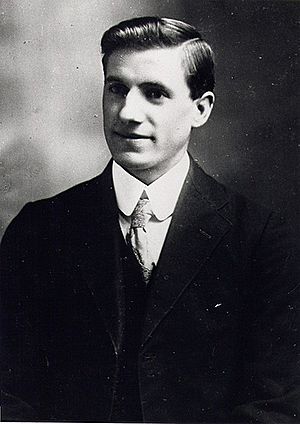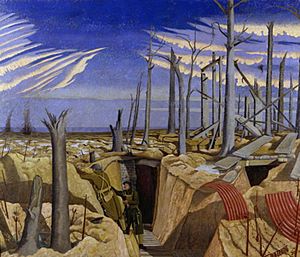Jack Harrison (VC) facts for kids
Quick facts for kids
John Harrison
|
||||||||||||||||||||||||||||||||||||
|---|---|---|---|---|---|---|---|---|---|---|---|---|---|---|---|---|---|---|---|---|---|---|---|---|---|---|---|---|---|---|---|---|---|---|---|---|
 |
||||||||||||||||||||||||||||||||||||
| Born | 12 November 1890 Kingston upon Hull, East Riding of Yorkshire, England |
|||||||||||||||||||||||||||||||||||
| Died | 3 May 1917 (aged 26) Oppy, France |
|||||||||||||||||||||||||||||||||||
| Allegiance | ||||||||||||||||||||||||||||||||||||
| Service/ |
||||||||||||||||||||||||||||||||||||
| Years of service | 1915-1917 | |||||||||||||||||||||||||||||||||||
| Rank | Second Lieutenant | |||||||||||||||||||||||||||||||||||
| Unit | The East Yorkshire Regiment | |||||||||||||||||||||||||||||||||||
| Battles/wars | World War I | |||||||||||||||||||||||||||||||||||
| Awards | ||||||||||||||||||||||||||||||||||||
| Other work |
|
|||||||||||||||||||||||||||||||||||
|
Rugby league career
|
||||||||||||||||||||||||||||||||||||
|
Playing information
|
||||||||||||||||||||||||||||||||||||
| Position | Wing | |||||||||||||||||||||||||||||||||||
|
||||||||||||||||||||||||||||||||||||
John Harrison (born November 12, 1890 – died May 3, 1917) was a famous rugby league player for Hull FC. He later became an officer in the British Army. He was given the Victoria Cross after he died, which is the highest award for bravery in battle for British and Commonwealth soldiers. He also received the Military Cross.
Early Life and Rugby Career
John Harrison was born in Hull, England, on November 12, 1890. His father worked in a shipyard. After school, John went to St John's College in York. There, he was the captain of the rugby team. He also played cricket and swam for the college.
After college, John became a teacher at Lime Street School in Hull. While in York, the York rugby league club noticed his talent. He played five games for them in 1911–1912 and scored three tries.
In September 1912, he moved back to Hull. He joined Hull F.C., a well-known rugby team. On September 1, 1914, he married Lillian. In the 1913–1914 season, he set a record by scoring 52 tries. Overall, he scored 106 tries in 116 games for Hull FC until 1916. John Harrison played as a right winger. He scored a try in Hull F.C.'s 6–0 win against Wakefield Trinity in the 1914 Challenge Cup Final. This big game took place in Halifax in front of 19,000 fans.
A Brave Soldier in World War I
Soon after his son, Jackie, was born, John Harrison joined the army. This was during World War I. He started officer training on November 4, 1915. On August 5, 1916, he became a temporary second lieutenant in the East Yorkshire Regiment. He was part of the 11th Battalion, also known as the "Hull Tradesmen."
In February 1917, John and his unit were sent to the front lines. He quickly faced intense fighting. On February 25, he led a patrol into no man's land, which was the dangerous area between enemy trenches. For his bravery in this action, he was awarded the Military Cross (MC). The award said he showed "great courage and skill" and was a "splendid example."
On May 3, 1917, John Harrison performed the actions that earned him the Victoria Cross (VC). This happened during the Capture of Oppy Wood, which was part of the Battle of Arras. His unit was ordered to attack a wood near Oppy. However, his platoon got stuck because of heavy machine gun fire.
The official report for his Victoria Cross explains what happened:
T/2nd Lt. John Harrison, M.C., E. York. R.
For most conspicuous bravery and self-sacrifice in an attack.
It was very dark and smoky from explosions, making it hard to see. Even so, 2nd Lt. Harrison led his company towards the enemy trench. They faced heavy rifle and machine-gun fire but had to pull back. He quickly reorganized his men in the dangerous "No Man's Land." He attacked again in the dark under terrible fire, but it was still unsuccessful.
Then, this brave officer, all by himself, ran towards the machine-gun. He hoped to destroy the gun and save the lives of many of his soldiers.
His willingness to sacrifice himself and his complete disregard for danger inspired everyone. (He is reported missing, believed killed.)
John Harrison's body was never found. He is remembered at the Commonwealth War Graves Commission Arras Memorial in France.
His Legacy
In March 1918, John Harrison's wife, Lillian, received his Victoria Cross from King George V at Buckingham Palace. People in Hull raised money to help pay for their son, Jackie's, education. Jackie later became an officer in the Duke of Wellington's West Riding Regiment. He was killed as a captain during the Battle of Dunkirk in World War II and is buried in the Dunkirk town cemetery.
Lillian Harrison passed away on December 5, 1977. She left John's medals to the East Yorkshire regimental museum in Beverley. These medals are now part of the Prince of Wales's Own Regiment of Yorkshire Museum in York.
In 2017, a book about John Harrison, titled The Heroic Johnsman: The Story of Jack Harrison VC, MC, was released by Patrick H. A. Neal.
 | Claudette Colvin |
 | Myrlie Evers-Williams |
 | Alberta Odell Jones |


